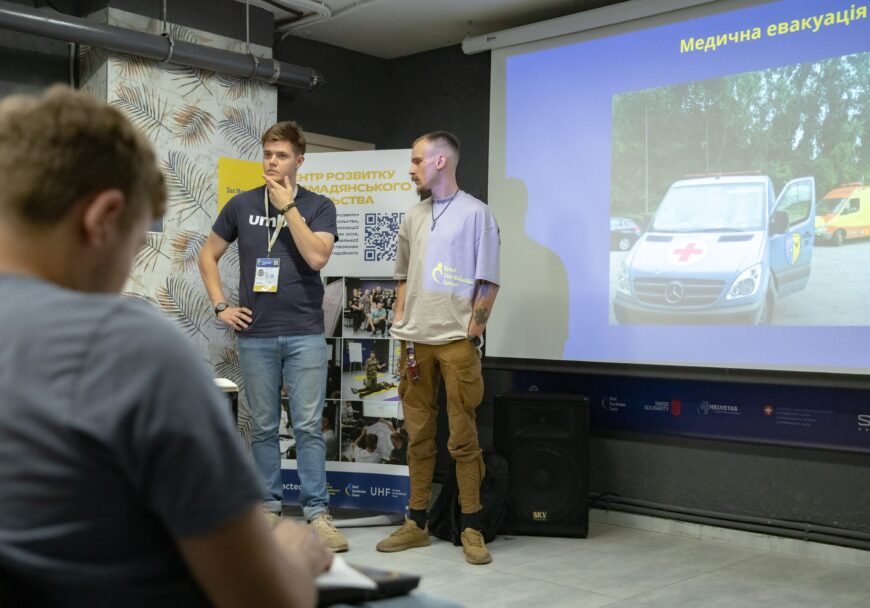The war continues to wreak havoc in Ukraine, killing and injuring thousands of civilians, including children.
Constant shelling of civilian infrastructure, the destruction of vital social institutions, and the continued displacement of the population have led to a large-scale humanitarian crisis.
Following Russia’s full-scale invasion, Ukrainian civil society mobilized like never before. From the beginning of the war on February 24 to June 30, 2022, 4,365* civil society organizations were registered in Ukraine.
The surge in humanitarian actors has unveiled coordination challenges. The complexity of multi-sectoral needs and the unique needs of individual populations underscored the necessity for timely and accurate national-level information on humanitarian needs and service status.
Civil Society Organizations (CSOs), largely staffed by volunteers, require technical support, financial aid, and material assistance to enhance security management and protect their volunteers dealing with extreme psychological distress in high-stress environments. Also, local authorities and humanitarian actors responsible for frontline emergency aid often lack the coordination support.
The challenges we face in our work include repair of volunteer vehicles and fuel for missions, but thanks to the Relief Coordination Center’s assistance, these problems are mostly solved. Another challenge is to motivate volunteers who have been working for more than a year and are very exhausted.
Funded by UK aid from the British people, Acted supports operation of two Relief Coordination Centers (RCC) in Zaporizhzhia and Kharkiv cities.
The RCCs coordinate local authorities, 410 local civil society organizations and 50 international NGOs that provide humanitarian aid, evacuations, medical help, infrastructure restoration, social projects and assistance to internally displaced persons in Kharkivska and Zaporizka.
How RCC coordinates frontline volunteers’ humanitarian efforts
Mykhailo is 38. He is one of the founders of the charity fund ‘There is a Volunteer’. Before the war he had his own event agency.
We became an official charitable foundation in May 2022, and the beginning was difficult because we had to look for large organizations and donors to help with humanitarian aid. The team of our foundation was made up of friends and acquaintances who stayed in Kharkiv, including hosts, animators, and the entire event industry that worked with us before the war. Currently, our team consists of more than 80 volunteers who know their job and work hard for people. Our hotline has been launched over time, we have many partners, donors, and we have also had a lot of support from media personalities.
Mykhailo team provide evacuation of the population, hygiene items, food, medicine, baby formula and diapers, animal feed, clothing, stoves, etc. After expanding the fund, ‘There is a Volunteer’ began to cooperate with the Relief Coordination Center (RCC) to establish communication with communities.
The RCC is the only point where everything is organized and you can get up-to-date information on the areas where humanitarian missions are planned and help with how to get a permission pass to the de-occupied territories. That is why the RCC has become our constant partner in coordination and information exchange.”
Among the tolls RCC teams developed are two unique ones: the SSA program (Sustainable Settlements Assessment Tool) and Interactive map of the shipped humanitarian aid.
The SSA creates a community profile that contains up-to-date information about the problems and needs of 132 settlements. Data on 8 important criteria, such as demographic, security, and logistics indicators, are updated monthly. The availability of this information is the basis for writing strategic and operational plans for community development.
The Interactive map allows everyone interested to get up-to-date and reliable information on the level of coverage of settlements with food, medical and hygiene assistance and to understand the state of meeting the basic needs of residents of the de-occupied territories. More than 100,000 views were achieved in 2023 on the Interactive map of the shipped humanitarian aid.

One of the memorable moments and examples of successful coordination was when our foundation received a lot of children's goods and gifts and needed to quickly distribute this resource. Thanks to the RCC, we quickly found a place to deliver everything and coordinated with another foundation that brought animators for the children, so we had a real holiday in three communities, it was very nice, not just to bring and distribute humanitarian aid, but also to cheer up the children in such a difficult time!
RCC’s coordination is ensuring the most effective coverage of people’s humanitarian needs. In 2023 Kharkiv RCC coordinated 4,657 people evacuation missions; accommodation of 3,110 persons in Collective Centers; deliveries of 15,716 tons of food aid, 1,827 tons of hygiene kits and 252 tons of medical kits.
*https://cedem.org.ua/en/news/4365-gromadskyh-ta-blagodijnyh/
**Names have been changed to protect the identity of the beneficiary.
